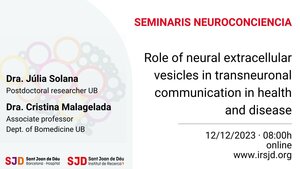#NeuroConCiencia| Role of neural extracellular vesicles in transneuronal communication in health and disease
- Speakers: Júlia Solana, PhD., postdoctoral researcher UB, and Cristina Malagelada PhD, Associate professor Dept. of Bomedicine UB.
Language: english
Abstract
Extracellular vesicles (EVs) play an important role in intercellular communication as carriers of signalling molecules such as bioactive miRNAs, proteins and lipids. EVs are key players in the functioning of the central nervous system (CNS) by influencing synaptic events and modulating recipient neurons. However, the specific role of neuron-to-neuron communication via EVs is still not well understood. Here, we provide evidence that primary neurons uptake neuron-derived EVs in the soma, dendrites, and even in the dendritic spines, and carry synaptic proteins. Neuron-derived EVs increased spine density and promoted the phosphorylation of Akt and ribosomal protein S6 (RPS6), via TrkB-signalling, without impairing the neuronal network activity. Strikingly, EVs exerted a trophic effect on challenged nutrient-deprived neurons. Altogether, our results place EVs in the spotlight for synaptic plasticity modulation as well as a possible therapeutic tool to fight neurodegeneration. Moreover we found that RTP801-induced toxicity is transferred via EVs, and therefore, it could contribute to the progression of neurodegenerative diseases, in which RTP801 is involved.
Registration

